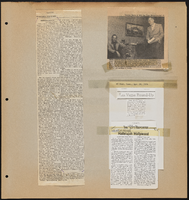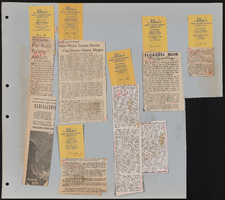Search the Special Collections and Archives Portal
Search Results

By-laws of the Nathan Adelson Hospice, November 30, 1978
Date
Archival Collection
Description
The by-laws of the Nathan Adelson Hospice establish the purpose and organization of the program, founded in 1978 in Las Vegas.
Text

Transcript of interview with Dennis Ortwein by Claytee White, May 6, 2009
Date
Archival Collection
Description
Dennis Ortwein arrived in Las Vegas in 1956. He shares many details about growing up in Montana, his parents and siblings, his education, and the moment in time when he was offered an opportunity to work in Las Vegas. He also lays out the path his singing career took, starting with school plays, duets with his sister, and high school quartets. Once in Las Vegas, Dennis taught for a while, served as principal, and was involved in creating programs that helped integrate schools. He also talks about his church choir work, entertainment in early Las Vegas, above-ground testing at the Nevada Test Site, and anti-nuclear protests. Dennis served as lab school and student teaching coordinator in Nigeria. He offers several anecdotes and stories about the time he and his family spent there. After retiring early (age 53), Dennis acted as consultant to the Esmeralda County school board, executive director for the National Conference of Christians and Jews, and wrote a book. He is currently enjoying his singing career by appearing at conventions, in musicals, and at weddings and memorials.
Text

Nicole Charlton oral history interview: transcript
Date
Archival Collection
Description
Oral history interview with Nicole Charlton conducted by Barbara Tabach on May 23, 2018 for the Remembering 1 October Oral History Project. In this interview, Charlton discusses her early life in Carlin, Nevada and relocating to Las Vegas, Nevada in 1990. Charlton is the Executive Secretary to the Clark County Coroner John Fudenberg and was among the first from the Coroner's office on the scene of the Route 91 shooting in Las Vegas.
Text

Transcript of interview with Ernie Hensley by Lisa Gioia-Acres, Janurary 25, 2008
Date
Archival Collection
Description
Ernie Hensley, an accomplished African American musician, was born in Washington D.C. on March 14 1940, the son of Ernest W. Hensley Jr. and Gladys Barbara Hensley. Both of his parents worked for the federal government in the nation's capital. Ernest W. Hensley Jr., was an employee at the Department of Defense and Gladys Barbara Hensley mother, who was an excellent pianist and drum major, ultimately set her musical career aside to provide for her family and worked for the National Labor Relations board. At the age of seven, after finding a saxophone in his grandmother's attic, Ernie embarked on his musical journey. He took lessons at the Modem School of Music in Washington D.C. Eventually acquired proficiency with the clarinet and the flute through long hours of practice. Ernie attended a historically black school, Armstrong High School in D.C., until he was transferred to integrated McKinley High School in 1954 following the Brown v. Board of Education ruling. Ernie recalls his experience in a new desegregated environment. After High School in 1957, Ernie joined the Air Force as a member of the 511th Air Force Band. In 1959 he resettled in France to play saxophone for the Air Force Band. Emie ultimately made a career in the Air Force. He had countless experiences of performing around Europe and in Washington D.C. at places like Constitution Hall. A dream came true when Emie was honored to become a member of the "Airmen of Note," the premier jazz ensemble for the United States Air Force. He retired from the Air Force in 1979. Because of his distinguished career in the United States Air Force, Emie had a number of opportunities once he retired from the military. He moved to Las Vegas in 1979 at age 39 and after living in area for just a few weeks, Emie started working with Johnny Haig 3 nights a week. Shortly thereafter, Emie found a long-term home working with Jimmy Mulidore's group at the Hilton for nearly a decade until 1995. Throughout Ernie's lifetime he has been fortunate to work with notable musicians such as Andy Williams, Sammy Davis Jr., Somers, Juliet Prowse, Steve an Eydie and his good friend Sarah Vaughn. Emie, along with his wife Carolyn, a retired UNLV faculty member, still resides in Las Vegas.
Text

Interview with Paul Guthals, April 14, 2005
Date
Archival Collection
Description
Text

Interview with James Donald Merlino, November 7, 2004
Date
Archival Collection
Description
Text

Interview with Donald David James, July 12, 2006
Date
Archival Collection
Description
Text



